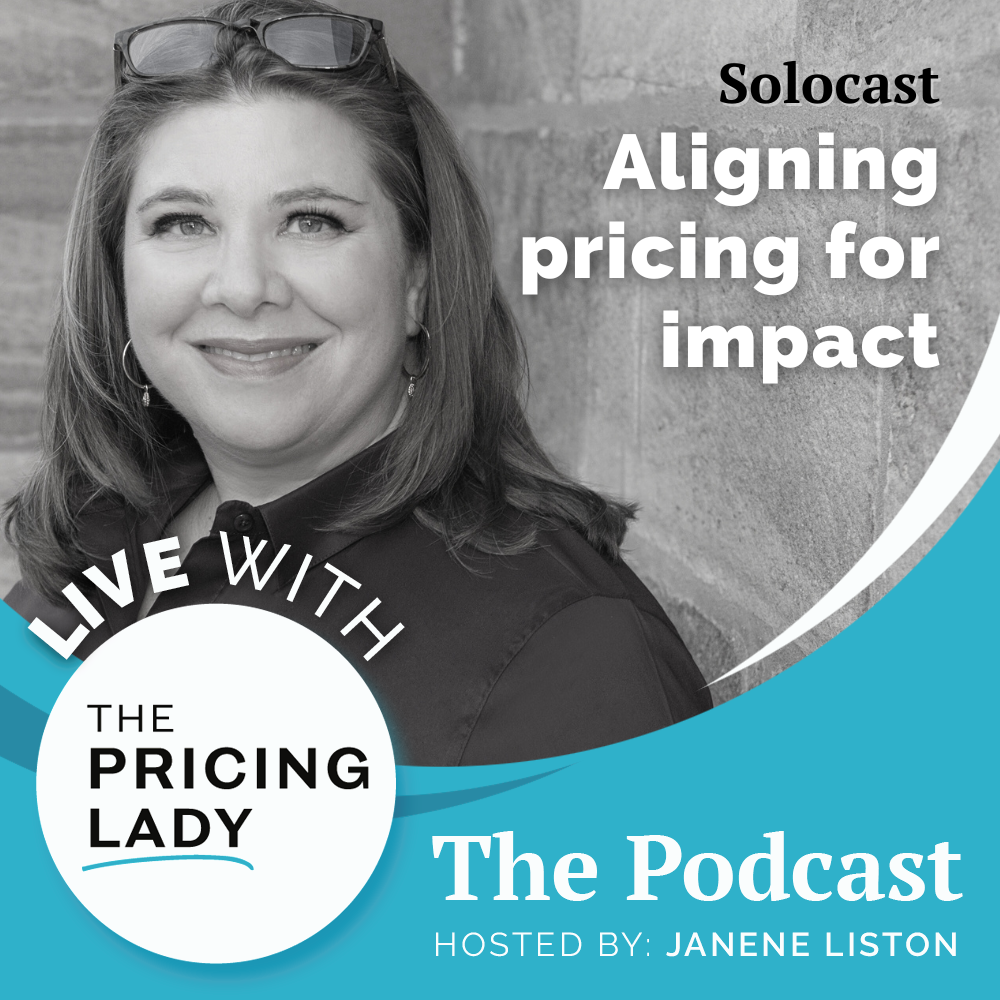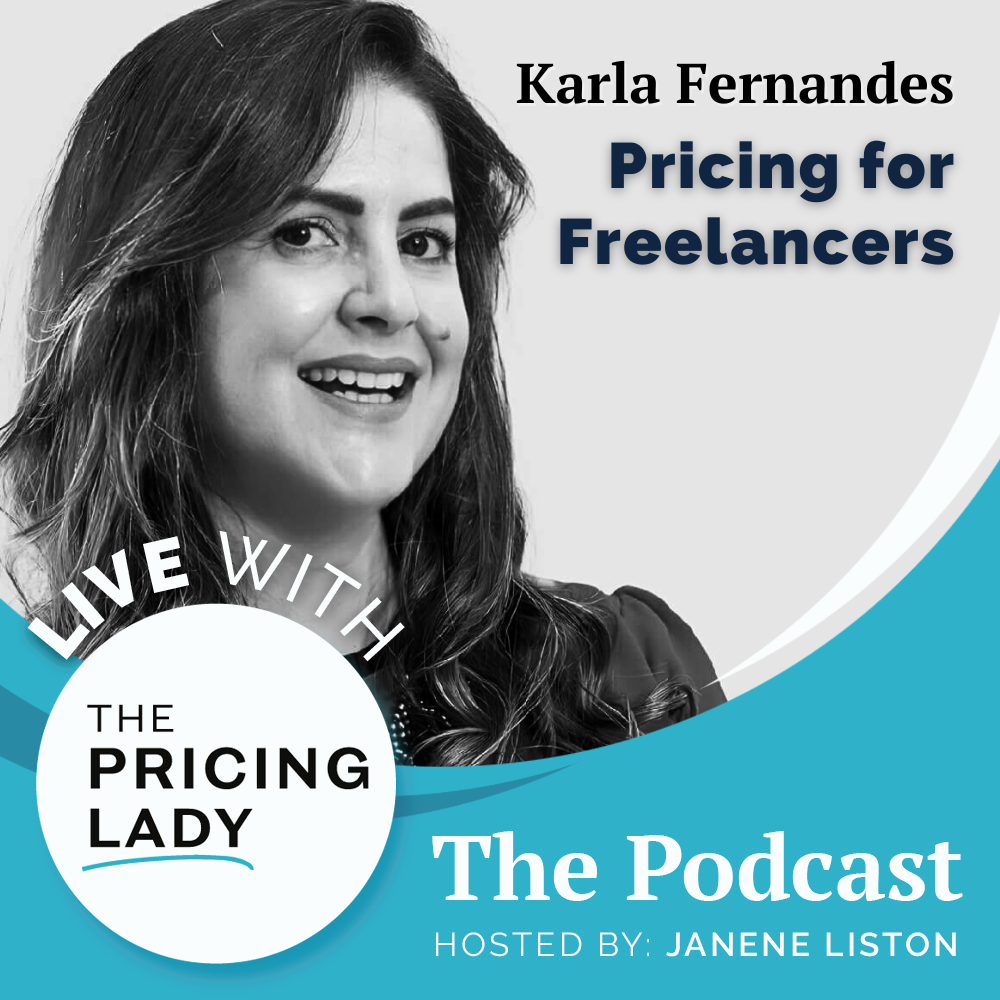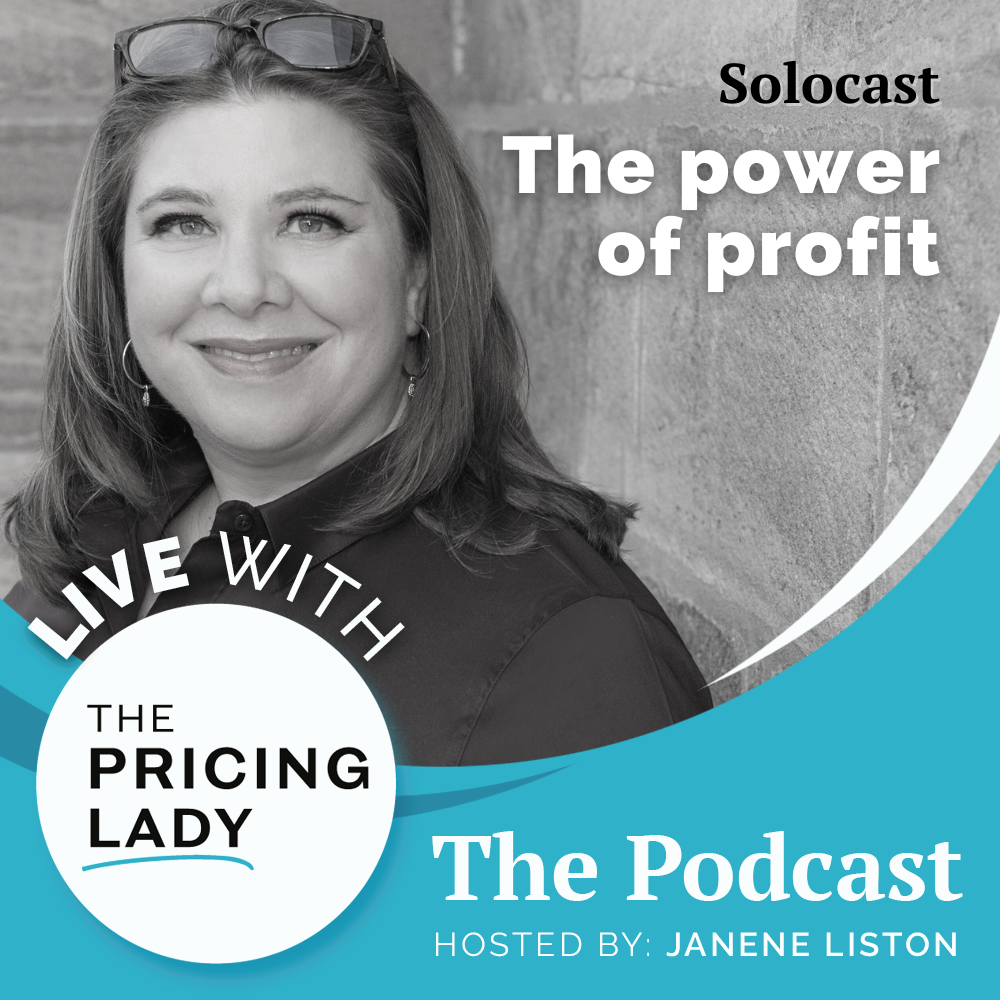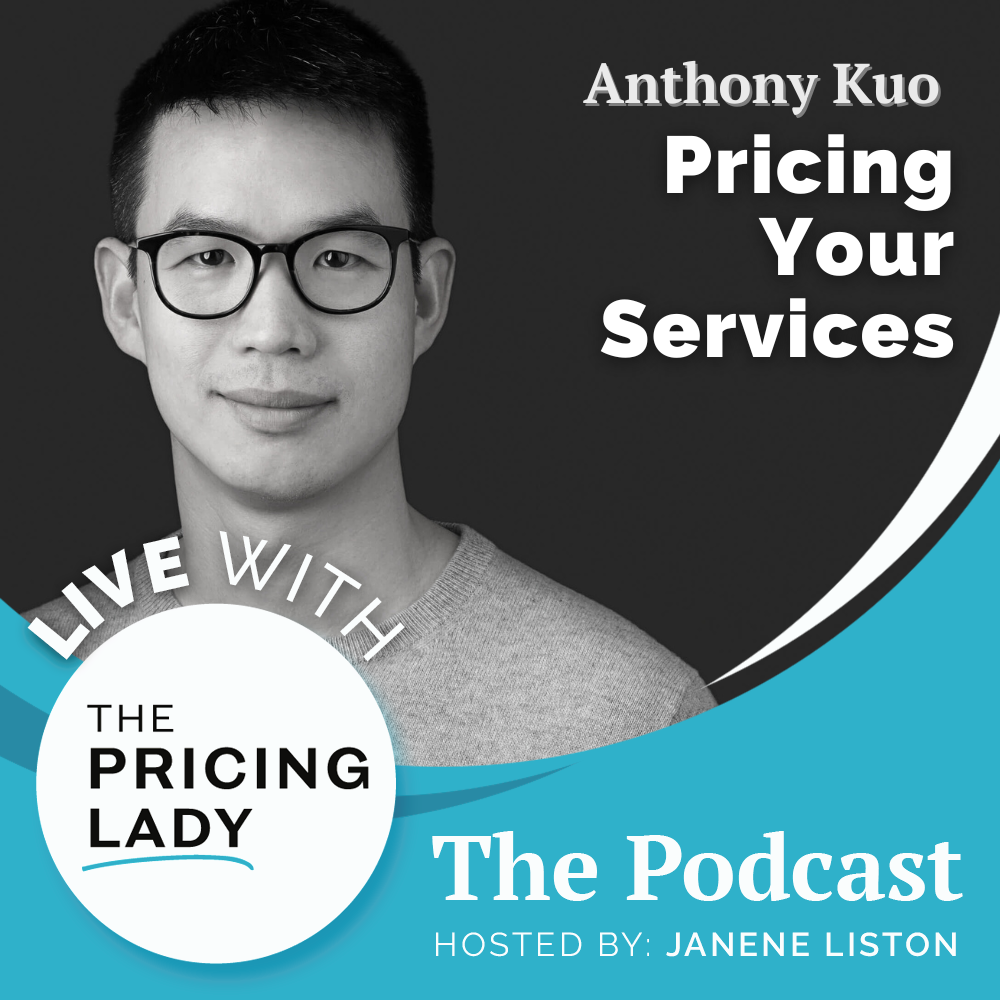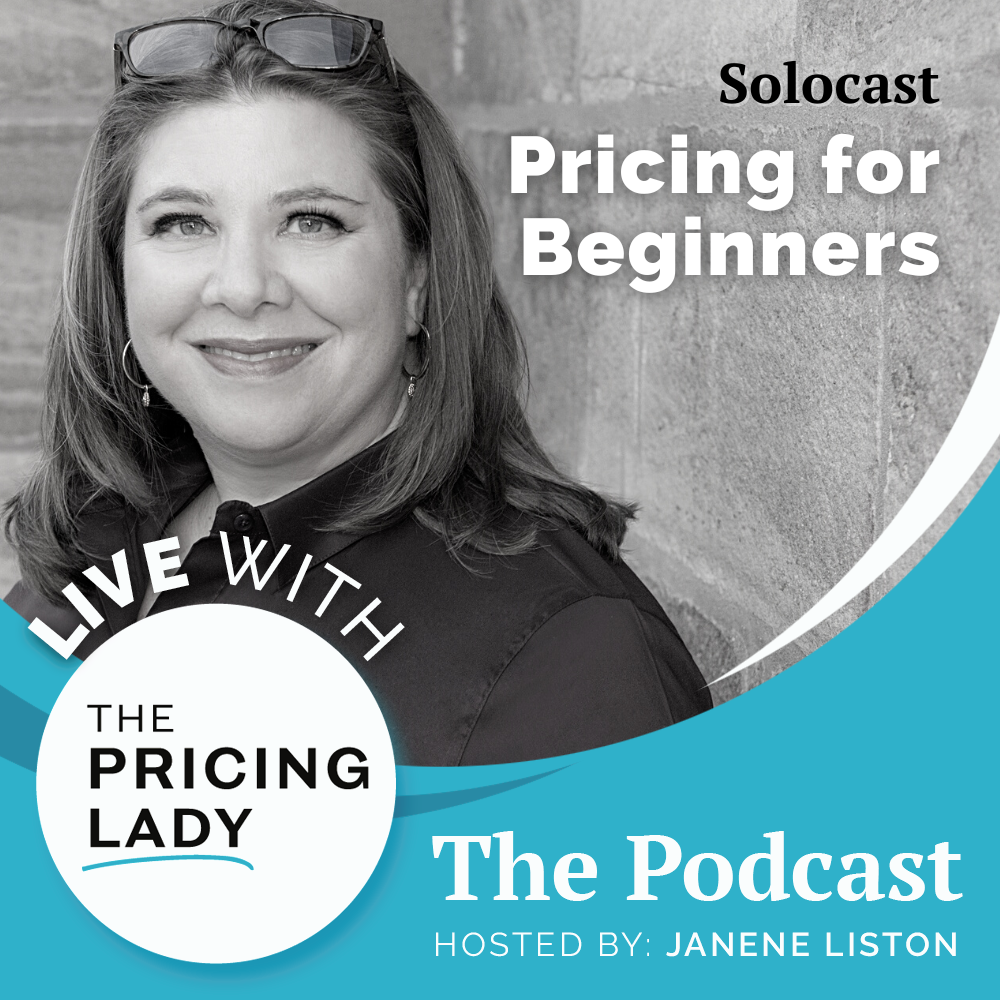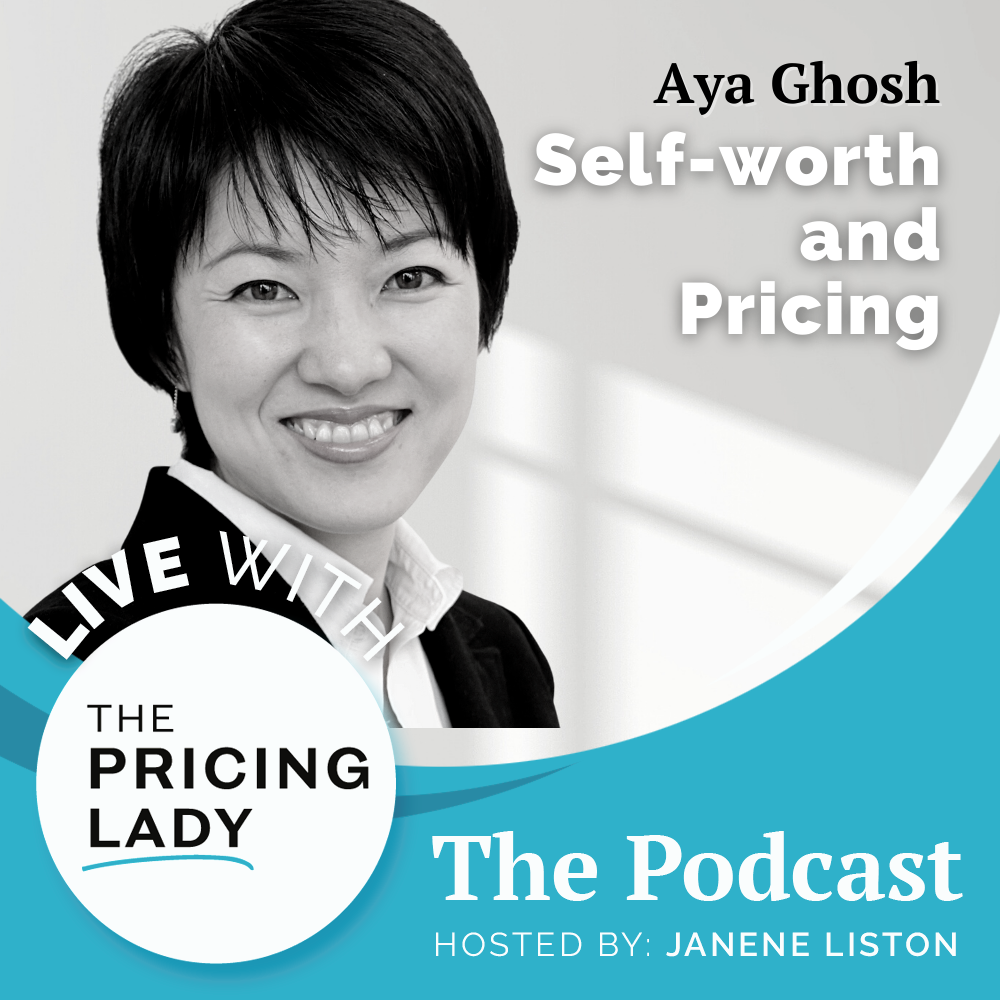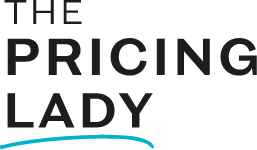How can you improve your relationship with money?
Great question now let’s get some answers.
As you know I’ve invited two money experts, Ilana Jankowitz and Clara Creitz, onto the show recently to talk about Women & Money. In part 1 we took a look at where our money mindset comes from, how it disrupts our path to success and some of the things that women do well when it comes to money. If you haven’t listened to part 1 yet, listen here.
The challenges you face with money are not always easy to identify or know where they come from. Often times making the change is difficult. It can even be emotionally painful. But it doesn’t mean that you don’t try. You keep working at it step by step, because it matters to you, your family and friends, even to your business and clients. It’s the only way to make things better and improve. We are all here to offer support.
In This Episode
In this episode, Part 2, we shift gears to look specifically at the tips and tactics the Clara and Ilana have to share with us. For example you’ll learn about a three-step process you can try that’ll help you get on the right track. You’ll hear about the importance of understanding one’s wealth structure, retirement situation, and insurance coverage as a means to understanding where you are now and how to get to where you want to go.
I loved the part about having a “money date” with loved ones to discuss finances. And you’ll discover how ancestral background and traumas can impact your beliefs and behaviors around money. As well as how the only way through to financial freedom is by you addressing those underlying issues. All that and so much more as we wrap up this two-part series.
Podcast Episode Highlights
- 0:00 Intro
- 1:27 Health Check or Analysis
- 5:12 Speaking About Money
- 7:10 Not Enoughness
- 12:10 The Big Thing Comes in the Mindset
- 18:47 Be Open to Learning
- 24:34 Wrapping it Up
Favorite Quotes
“The scarcity stories. If our parents have lived, or grandparents have lived through the war. All those things are deep rooted in us. Then as we’re trying to do things and we kind of feel like we on a seesaw, that we’re actually not going anywhere. Consciously we’re trying to do something, but subconsciously we actually don’t believe we are good enough or we are never gonna achieve those goals.” Ilana
“100%. You basically get triggered until that doesn’t trigger you anymore. You’ve learned the lesson. Then you go on to learn more. Because we’re, on the journey, we are learning lessons every single day.” Ilana
“Not only should you be looking for your own role models and or getting help with these things, but you should be looking for how you can be a role model to other young ladies.” Janene
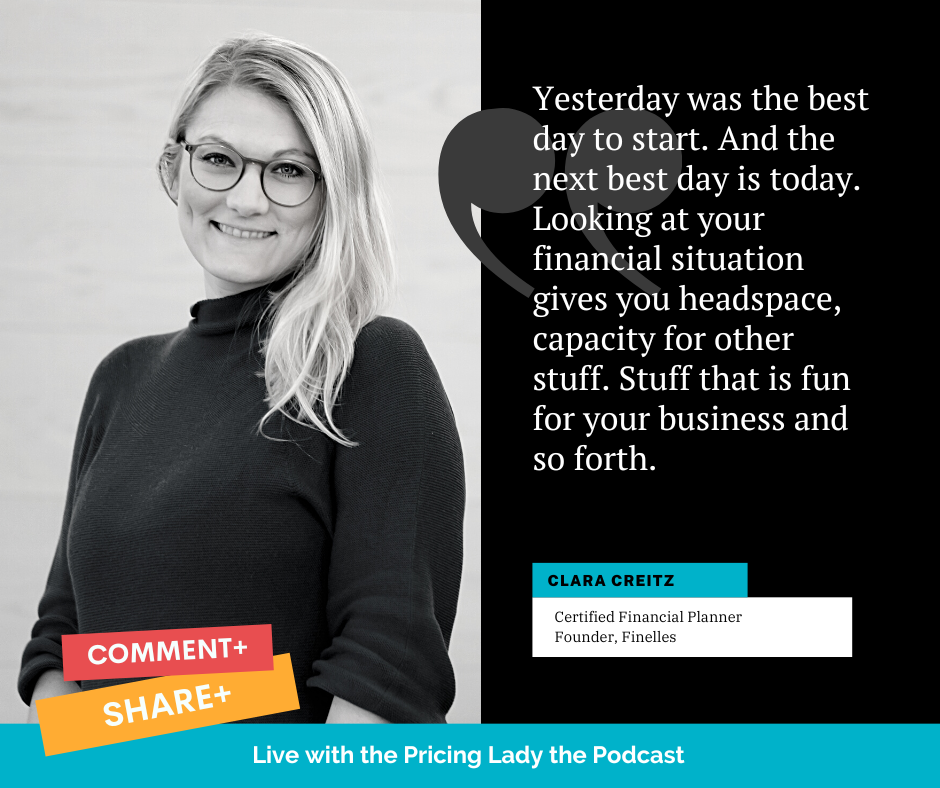
“Finance is not rocket science only. Rocket science is rocket science. It’s just a different language and you don’t learn it within a day. It’s a process and it also is a jargon, but you can learn this because many, many people before have learned this.” Clara
“Women need to learn to receive more. Open the flow of money, don’t block it.” Ilana
“It doesn’t matter where you start but that you do start. Whether it be your mindset, your personal finance, your pricing or anything else, any other topic really. Just get started.” Janene
Episode Links
Reach out to these Amazing Ladies.
>>> Clara Creitz | LinkedIn | Instagram | Facebook
>>> Ilana Jankowitz | LinkedIn | Instagram | Facebook
Take the money quiz at Ilana’s website.
Clara’s Book Recommendation: The Millionaire Next Door
Ilana’s Book Recommendation: The Psychology of Money and Atomic Habits
Rate, Review and Follow the Show on Apple Podcasts
“I’ve just found my Pricing Resource!” … “A binge worthy podcast.” … “I learned so much about how to improve my profitability.”
If that sounds like you, please consider rating and reviewing the pricing podcast. It helps me spread the word to more people and ultimately get more small businesses on the path to sustainable profitability and business success. Click right here, tap to rate with five stars, then select “Write a Review.” Last let me know what you loved most about the episode!
If you don’t already, follow my pricing podcast. New episodes come out every couple of weeks, plus bonus episode. If you’re not following there’s a good chance you’ll miss something. And last, listen to more episodes there are more than 130 episodes to choose from from setting prices to executing them to changing them you’ll find answers to many of your pricing questions.
Reach Out, Connect and Book a Call with Janene
Linkedin | YouTube | Facebook | Email List
Get started improving your business. Sometimes it’s difficult to know where to begin. I suggest you Download the the self assessment Pricing Scorecard. Get a view of what’s working and what’s not working when it comes to pricing in your business. Figure out where to start making improvements.
Get in touch with Janene, your Business Strategist & Pricing Expert. If you’ve got a business question that needs answering, a pricing challenge you’re facing or you have suggestions for future topics or guests, let me know. Your questions and insights often become episodes. Share yours with me and let’s see where it goes. Contact Janene.
Listen up! Don’t miss out. There’s a lot going on and you’ll want to be in the know. Follow my YouTube channel (rate it too please) so you don’t miss an episode of Live with The Pricing Lady or join my Email List.
Transform your business and life. My mission is to help you build a sustainably profitable business. One where you can confidently charge for the value you deliver. Curious about my coaching and consulting offers, check them out. Let’s see how we can work together. Book a complimentary Call
Episode Transcript
Janene: When it comes to personal finance, what are some of the tips or tactics that you can share with the women who are listening about what they can do with their money.
Clara: I think what I usually try to separate is into three packets.
The first thing I usually do in my one-on-one work, but also my courses, is really make a health check or an analysis of your current situation. Because often people start with the last step, like, how can I invest? Right. But then there’s so many questions, how much should I invest? Which top products should I invest?
Where should I invest? Blah, blah, and so forth. For this, you need to first do your foundational work. I recommend to really get basically all your financial documents sorted and get a good overview of your current income and spendings. Often with this exercise.
Looking at, for example, expenses of the last year. Going really through them in a detailed manner. Most people understand how they can optimize that. Often, they’re shocked and it’s not the typical things like rent and so forth. It’s often you see behavioral patterns when it comes to shopping or other type of things.
Which they reflect on the same goes for wealth structure, understanding how much you have in different accounts. Often, we forget accounts, including also certain insurances. Also looking at the retirement situation. How much will I get from different pots? The same goals for what will I get from different parts in case of death and disability especially if you have kids and or a partner and you bought real estate because that’s where often there’s a big gap. So doing that analysis.
Defining the Goals
Clara: Second step is then defining really the goals. What are you trying to achieve? The last one is implementing a plan to achieve these goals based on where you are right now and where you want to go.
It’s a little bit like, Google Maps, I’m in Zurich and I want to go to the States, then obviously the last thing I do is look at how to get where I first need to understand where I am and where I want to go. That’s probably it from, let’s say a high level of perspective.
Janene: I think for many of us, it’s also tricky in the context of being an expat. Being an American it’s like a different level of tricky above and beyond that. Sometimes it can feel very mysterious to understand what your options are.
What’s really needed and what’s not needed. I was very surprised to find out first some of the stuff that I have. The pension contribution from the companies I worked for here in Switzerland, that as a single person, the money doesn’t necessarily go to my family.
I thought, oh gosh, I need to understand that better and find out what that means. Of course, once I passed away and whatever, but still, it was important me to find out because I earned that money and somebody that I love should benefit from it. Let’s put it that way.
Thank you for sharing those tips with us. Ilana, I’m curious because of course, a lot of what you do with people is kind of like getting them to this point where they can more easily work with someone like Clara as well. Or work with someone like me on pricing in their business.
Speaking About Money
Janene: What are the tips or tactics that people can use to start to prepare themselves from a mindset perspective to get a hold of, or tackle this topic of money in whatever context that means for them?
Ilana: It’s actually very similar to what Clara mentioned already.
Just speaking about money, having a money date with your partner, if you’re in a relationship or with your children, whoever is involved, your loved ones. Knowing what you’ve got, what you don’t have, where the gaps are, what is missing. Definitely looking into how you can slim down the budget.
It’s basically echoing what Clara said, but I go then more into the ancestral background, into the traumas that happened along the way. It’s very interesting because when somebody works with me, they often say to me, I had a happy childhood. I was a happy little girl. Until we start digging into the things that happened, then these stories come out and often in those stories is where all the seeds of I don’t deserve this or I’m not good enough, comes from all the beliefs that we’ve been told that we’ve heard over the years from our grandparents.
The scarcity stories. If our parents have lived, or grandparents have lived through the war. All those things are so deep rooted in us. Then we’re trying to do things and we are wondering why we kind of feel like we on a seesaw that we’re actually not going anywhere. Consciously we’re trying to do something, but subconsciously we actually don’t believe we are good enough or we are never gonna achieve those goals.
Not Enoughness
Ilana: The work that I do, I go back into thinking into where did this all start? That they do together with me privately, but then we also do in a group. What is amazing is all the women have you they find have got the same issues as them. They often think it’s just them going through whatever it is, or that they’re the only one, and then they realize they’re not.
It’s quite universal, the stories and lots of people, over the years people have interviewed me and asked me if I had to say what is the one universal issue that I find with woman. It’s not enoughness.
Janene: That’s exactly what I was gonna say.
Ilana: Yeah. Not enough, not enough money, not enough clients.
I’m not good enough. I won’t have enough. I’m not enough. And it’s just so in their DNA. They get that from the generation before and they don’t realize the trauma that that creates. You can’t just switch it off.
Janene: No, you can’t. That’s very true. One of the things I talk about when I run into this with my clients is we talk about, okay, at what point in time if we all agree that children when they come into this world are worth. That means that you came into this world worthy. At what point in time when you were three months, or six months, or a year, or three years, or 10 years or 20 years old, at what point in time did something switch in your brain that made you feel like you were no longer worthy? And I always find that an interesting discussion.
They Hear Those Conversations
Ilana: I think it happens already when you’re still in your mom’s womb because you are in conversations. I’ve had many clients over the years that have told me they know that they weren’t wanted, or they know that their father wanted them to be aborted. When you speak to them, they say, I had a happy childhood.
But when you stop digging, these things come up. I know that my father wanted me to be aborted because we had six other children and they couldn’t afford it. We were living in Ireland or whatever the story is. The children can hear, Clara, you would vouch me for this.
They hear those things; they hear those conversations already before they’re even born. They’re born into a home that’s filled with love, but there’s also things that are lacking and that becomes part of the person’s DNA that makes us who we are.
Janene: Yeah. I’m curious, Ilana, can you pick up something…
My understanding is that a child’s mind is like, I’m here, this is happening, therefore it has to do with me and I’m the reason that it’s happening, right?
As a child, if you see a parent who’s in pain or feels unworthy, can a child adopt that? Yes. From the parent? Maybe it’s not their own worthiness issue, but they’re adopting it from a parent or a trusted loved one, or even a generation or two before.
Ilana: They always take it on as their fault.
A parent is getting divorced or they’re fighting about something. The kid feels it’s their fault that they’re fighting about whatever it is. Often there’s a lot of children suffer abandonment, physical abandonment, or mentally emotional abandonment. Your parents weren’t there. They were working. I was in the “krippe”.
Self-esteem is Getting Formed Already
Ilana: I was at the daycare, I was with a nanny. I was with a granny. They feel abandoned. That whole self-esteem is getting formed at that age. They believe they are to blame. If the parent left, they did something wrong. They were naughty, they couldn’t keep the parent there, the father there.
Or if a parent passes away, they don’t, their child mind doesn’t understand what is actually going on. And they take it on as themselves and work with an incredible amount of, that’s why so many people are in therapy.
It’s not your fault.
Janene: It really isn’t. But we take it on. Yeah, we take it on divorce.
Ilana: Not your fault. You couldn’t force your dad to stay. He had another girl down the road.
Janene: Yeah. I wanna start wrapping this up. If I think about the conversation and women in money.
What I’ve heard today is that there’s really no, how do I wanna say this? I was gonna say there’s no reason and that’s the wrong statement. I’m trying to find the right words here, but I mean, there’s every reason out there that women can do this as well as anybody else. There really is no difference from like a competence standpoint, from an understanding standpoint.
The Big Thing Comes in the Mindset
Janene: It is totally incompletely possible. I think that the big thing comes in the mindset and part of that is from our upbringing. Part of that is just we’re born with it, let’s say. But the important thing is that, at least from my experience and firm hearing for you. I’d be curious about your thoughts on this is that the mindset piece is so important to get that right and to, I don’t, I’m not sure, and maybe Ilana you have a different opinion about this.
I’m curious, I’m not sure your mindset is ever fixed, but you’re always kind of making progress and checking away at it and working at it, and then universe has a way of throwing something at you that’s bigger and it takes you outside your comfort zone again. Is that a fair assessment?
Ilana: 100%. You basically get triggered until that doesn’t trigger you anymore.
You’ve learned the lesson. Then you go on to learn more. Because we’re, on the journey, we are learning lessons every single day. I used to get triggered for things that I couldn’t deal with, I used to suppress, and I’d get triggered until it came up again, then I’d have to deal with it eventually, or I would just suppress it like every everybody else.
Until you learn the lesson, you get different lessons and different experiences. That’s a hundred percent true.
Janene: Life is good fun, isn’t it? I’ve got a couple of wrap up questions for you ‘cause we’re getting to the hour mark here and I wanna make sure that we all get out of here.
Clara, why don’t you share with us one thing that you want people to remember today based on our conversation about personal finance.
Role Models
Clara: The whole topic around role models. Just because we don’t have them doesn’t mean that we cannot think further, right? If we have not seen people doing what we want to do, they are out there. They might not be in your personal environment.
I think looking for people to exchange, getting help or even getting the skills is definitely something that would help you. Then you can be a role model for your personal environment. That’s number one. The second thing is what you already mentioned is you can do this, right?
Finance is not rocket science only. Rocket science is rocket science. It’s just a different language and you don’t learn it within a day. It’s a process and it also is a jargon, but you can learn this because many, many people before have learned this. As soon as you learned it and took care of it, then often that gives has a positive impact, not only on the financial side, but really on the happiness side as well.
People who take care of their money often end up being more happy generally because they feel safe and secure with their current situation.
Janene: I’m so glad that you brought up being a role model as well. And I think that for me, from our conversation, that’s one of the most important things that I’d like people to take away with, is that not only should you be looking for your own role models and or getting help with these things, but you should be looking for how you can be a role model to other young ladies.
We can start to break this cycle as we move on to future generations. Thank you for sharing that.
Clara’s Business Advice
Janene: What’s the best business advice you’ve been given over the years? We’re all business owners here and I’m curious what you can share with the audience, Clara.
Clara: I think just do it right?
I think when we are taught in a corporate world to make 500 analysis and put in spreadsheet and then into a PowerPoint, and at the end nobody looks at it and that’s not how it works if you have to earn your own money, I think try being fast, trial and error, trying out new things. At the same time, also don’t lose yourself in all these details.
I think that’s what I personally learned is you just go for it and then also stick with it. Don’t change your strategy every two weeks because then you don’t have enough data points and experience to see if it worked or not.
Janene: Super. Thank you. And is there a book or a blog or a podcast you’d recommend to listeners?
Janene: What’s the best business advice you’ve been given over the years? We’re all business owners here and I’m curious what you can share with the audience, Clara.
Clara: I think just do it right?
I think when we are taught in a corporate world to make 500 analysis and put in spreadsheet and then into a PowerPoint, and at the end nobody looks at it and that’s not how it works if you have to earn your own money, I think try being fast, trial and error, trying out new things. At the same time, also don’t lose yourself in all these details.
I think that’s what I personally learned is you just go for it and then also stick with it. Don’t change your strategy every two weeks because then you don’t have enough data points and experience to see if it worked or not.
Janene: Super. Thank you. And is there a book or a blog or a podcast you’d recommend to listeners?
Have you read The Millionaire Next Door?
Clara: Not for business but for Personal Finance. Something that really gave me an aha moment was the book called The Millionaire Next Door. It’s a book, basically it’s a study in the US in the nineties and it’s kind of, changes your perspective of what a millionaire looks like and whatnot, right?
I think that really helps to understand also that anybody who is consistent over a long period of time is the most successful when it comes to money and not, not what seems to be right. I think that’s something I would recommend because it’s, it’s really a study on, on millionaires and non-millionaires, basically.
Janene: Yeah. I remember reading that. It was shortly after I got outta university, and it really had an impact onto me, I’m excited that you reminded me of that book and recommend it. I can recommend it as well. If people would like to reach out and find out more about how to work with you and what you offer, where can they do that?
Clara: I think the easiest is to go to my website, finelles.com. They can either book a free appointment with me or send me an email, but most information is okay, is right there.
Janene: We’ll put that and all other links to reach out to Clara on social media in the show notes, as well as link to the book you recommended.
Okay. Ilana, what’s one thing you’d like people to remember from our conversation today?
Be Open to Learning
Ilana: Just be open to learning. Open to, if you make a mistake, it’s okay. Try again and just be open to receive woman struggle, and this is a money block. Got loads of money blocks and money myths and all sorts of things, but one of the money blocks is that women struggle to receive, they struggle to receive money, they struggle to receive compliments.
Somebody wants to pay for you for dinner, you say, no, it’s fine. Let’s look. They’re always finding excuses to receive women or givers. When we look at the difference between men and women, women are always doing, for others, they’re doing, they’re buying for others. They spend their money on others.
They buy food for the family, gifts for people. It’s always for others, not for themself. Men spend money on themselves. They spend money on investments, cars, watches, whatever women need to learn to receive. And they can start with simple things. Like if somebody pays your compliment, that’s a lovely top you’ve got on say, thank you.
It’s old. It cost me five bucks. Women need to learn to receive more. Open the flow of money, don’t block it.
Janene: I love that. A lot of people, a lot of times when I’m with friends and one phase the other compliment and then the other starts making up all this excuses.
I go just say, thank you. Thank you, I know I do. I do it myself sometimes. Actually last night we were at fires night and a friend offered to pay for my dinner. I said, oh no, you don’t have to do that. So yeah, there you go.
Ilana: Open to receive, allow the money to flow. There’s plenty of money out there.
Yeah, there’s plenty of clients out there. There’s no shortage. No stop being the shortage.
Check out the book The Psychology of Money
Janene: Great words. Ilana, what’s some business advice that you’ve been giving over years? Some good business advice.
Ilana: Be open to change. Be open to learning and be open to receiving advice when you speak to people. Network, learn, don’t think you know it all. Be open to trying something different. If something isn’t working, what Einstein says, if we keep doing the same things over and over, do something different. If it’s not working, reach out to somebody if you need the help.
Janene: Great advice.
Ilana: People are embarrassed, and they think I can’t, and I’ve had so many people come to me and say, I’ve been told about you, but it’s a little bit embarrassing. Had to go and get help.
Janene: Time and place. Was there a book or a blog or podcast you’d recommend for listeners or like to share with us?
Ilana: One of the books that I’ve read numerous times is The Psychology of Money. Very similar to the book you were talking about. A lot more updated, which is fantastic. It teaches you a lot of the psych psychology of the money and how the investment, how to invest with compound interest over a long time, and just what different people and different circumstances they tell the stories throughout the book.
I really recommend that book, the Psychology of Money, as well as atomic habits. Start with something small that makes the biggest difference.
Janene: I’m still making my way through it. I started reading it last month. It’s super interesting. I can also recommend that one as well. We’ll put those in the show notes.
One of the Biggest Myths When it Comes to Money
Janene: Ilana, my last question is where can people reach out if they’d like to find out more about how to work with you?
Ilana: At that interesting quiz on my website, mindfulmoneycoaching.online. Take the quiz. Happy to have a call with you to tell you what I see in the scores, what’s going on, and just how to change it. Really happy to do that.
Janene: Excellent. There you have the link. Again, we’ll put those in the show notes. Ladies, this has been absolutely wonderful and it always goes so fast. Anything else you’d like to add before we close this? Wrap it up for today.
Ilana: Yes. I work with a lot of money myths that are busted because they’re just myths.
One of the myths that I see on every, every single person that I work with is I should have sorted out my money by now. I get 20-year-old, 30-year-olds telling me this. 40-year-olds, it doesn’t matter if today’s the day you decide that you’re gonna sort out your finances.
Today’s the day. It’s a myth and it’ll keep you being embarrassed and stop you from reaching out. Today’s the day that you do it. Or tomorrow. The fact that you haven’t done it, or you haven’t fixed it by now, there’s no shame or secrecy. There’s shame and secrecy about that, is what you attached to it.
Wrapping it Up
Janene: Excellent. Clara, anything else to add?
Clara: I would add to that note is yesterday was the best day to start. And the next best day is today. Looking at your financial situation gives you headspace, capacity for other stuff. Stuff that is fun for your business and so forth.
Flying blind when it comes to this topic, it might be kind of a strategy of like, not really wanting to know what the situation looks like. But it gives you the opportunity to put together a plan and work on the plan; instead of knowing that you should have looked at the topic but feel a bit scared.
I think getting away of this feeling, scared feeling. I highly recommend starting earlier than later. What Ilana also mentioned with the book on compound interest. Obviously, most people when they learn this, there’s like, why didn’t I start when I was like 20 or so? I think that’s something most people regret.
Ideal is yesterday, but best moment is today.
Janene: I think that’s a good note to end on, that it doesn’t matter where you start but that you do start. Whether it be your mindset, your personal finance, your pricing or anything else, any other topic really. Just get started.
I wanna thank my two guests for being with me today. It’s been such an empowering conversation and I appreciate everything that you shared.
I appreciate those of you who have joined us live and those of you who will be listening later. Wishing everybody a great day. Thank you so much for being here with us, and as always, everyone, enjoy pricing.

